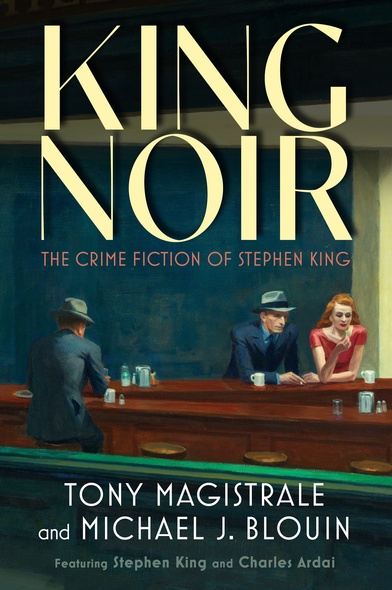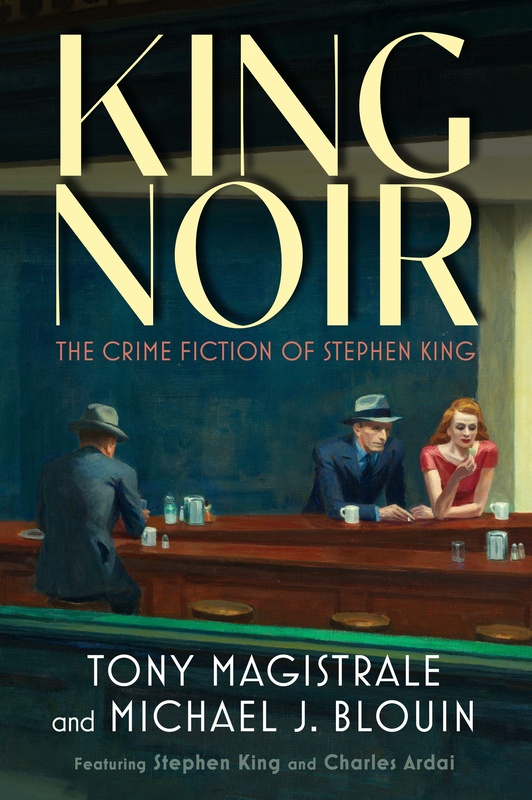
King Noir
The Crime Fiction of Stephen King
Over the past thirty years, Stephen King has received enormous attention from both the popular press as well as academics seeking to explain the unique phenomenon of his success. Books on King explore his canon in religious contexts, in political and historical contexts, in mythic—specifically Jungian—contexts, in Gothic/horror (especially American literary) contexts, and in a wide variety of other contexts appropriate to a writer who, over the past half century, has become “America’s Storyteller.” Beginning with a never-published chapter authored by Stephen King himself on the influence of the genre on his own writing, King Noir makes an invaluable contribution to King scholarship by placing King’s works in conversation with American crime fiction.
This is the third book that Tony Magistrale and Michael J. Blouin have coauthored on the work of Stephen King, and the first to consider King’s canon through the lens of crime fiction. King Noir examines not only King’s own efforts at writing in the detective genre, but also how the detective genre finds its way into work typically regarded as horror fiction.
In interviews, King has acknowledged his debt to earlier writers in the genre, such as Ed McBain and Raymond Chandler, and he much more often references hardboiled writers than he does horror writers. One could speculate that King became a writer because of his love of pulpy crime fiction, which he continues to hold in high esteem. From The Dead Zone to Mr. Mercedes, from the crime fiction of his pseudonym Richard Bachman to his most recent novel Holly, King returns obsessively to patterns established by American sleuths of every stripe, paying homage to them at the same time as he innovates on the formulas he has inherited. To focus upon a hardboiled Stephen King is to discover exciting new avenues for inquiry into one of America’s most enduring, and adaptable, storytellers.
Tony Magistrale is author of numerous books and articles, most of which have centered on defining and tracing Anglo-American Gothicism from its origins in nineteenth-century romanticism to its contemporary manifestations in popular culture, particularly in the work of Edgar Allan Poe and Stephen King. He has published three separate interviews with King, and Magistrale and Blouin both served as research assistants to Mr. King. Michael J. Blouin has published extensively on the American Gothic, especially on Stephen King’s fiction. In addition to his monograph Stephen King and American Politics, Blouin coauthored Stephen King and American History (with Magistrale); one of the chapters of that book unanimously won the Carl Bode prize for the best essay published in the Journal of American Culture 2020. He is also author of Democracy and the American Gothic.
Acknowledgments
Introduction: Stephen King and the Art of Detection
Chapter 1: “My Love of Crime Fiction and Its Influence on My Writing”
Stephen King
Chapter 2: Passion for the Pulps: A Dialogue with Charles Ardai
Chapter 3: Edgar Allan Poe, Stephen King, and the American Detective
Chapter 4: The Multiple Deaths of Richard Bachman
Chapter 5: The Open-and-Shut Cases of Mr. Mercedes and Holly
Chapter 6: Femme Noir: Misery and Dolores Claiborne
Chapter 7: The Incestuous Later
Chapter 8: Stephen King at the Brink: The Complicated Influence of Raymond Chandler
Chapter 9: Billy Summers and the Criminal’s Redemption
Conclusions: A Need for the Unknown
Notes
Works Cited
Index





